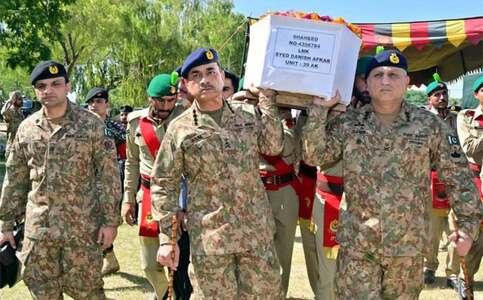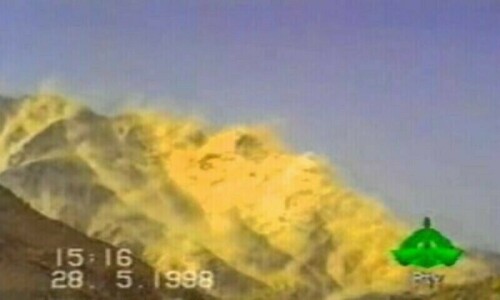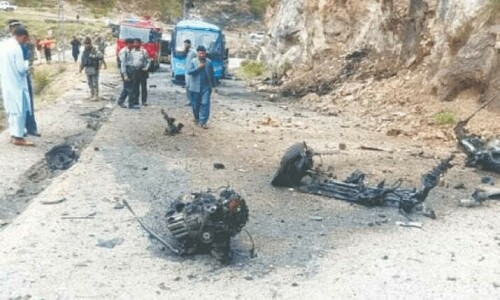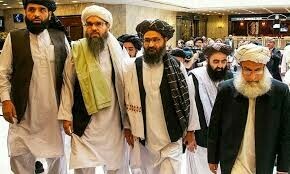ISLAMABAD, Oct 20: Richard Boucher, the US Assistant Secretary of State for South Asia, on Monday said ‘Friends of Pakistan’ were committed to helping the country overcome the financial crisis, but “wouldn’t throw money on the table”.
“It is not going to be a cash advance for Pakistan,” Mr Boucher told reporters at a media briefing at the US embassy, indicating that a framework for promising any kind of assistance would come only after a thorough assessment of Pakistan’s plans.
The statement by the top US diplomat for South Asia soon after he attended a preliminary meeting of the ‘Friends of Pakistan’ here dashed hopes of all those who were expecting immediate relief from the forum created last month to help Pakistan raise billions of dollars to avert a possible economic collapse, which is becoming imminent with every passing day and warnings by financial experts that the next 30 days were crucial.
The United States has been working behind the scenes with other governments ahead of next month’s crucial meeting of the forum comprising some of the world’s richest nations.
“It is going to be a strategic process in which Friends of Pakistan would look into what the (Pakistan) government is doing; what is it planning; and how could those efforts be supplemented,” said Mr Boucher.
“The assistance would be in the form of “strategic support to give ordinary Pakistanis better and safe life.”
Although an assistant secretary of state, Mr Boucher met the country’s top leadership, including two meetings with President Zardari and Prime Minister Gilani; and discussions with the foreign minister, the adviser on finance, the NWFP governor and the chief minister. Last but not the least, he also met Nawaz Sharif, the chief of the main opposition party (PML-N).
The US official noted that his government was cognisant of the enormity of economic and security challenges confronting Pakistan and its assistance was targeted to enable the country deal with its woes.
WAR ON TERROR: He reiterated Washington’s resolve to continue helping Pakistan in the war on terror and said new areas of cooperation in the fight against militancy and extremism were being explored.
Referring to his meetings with the Pakistani leadership, he said: “We looked into other areas we can help.”
The US has recently launched an initiative for training of Frontier Constabulary to improve its capacity to fight terrorists. A small unit comprising 25 special services troops has been deployed for this purpose.
Pakistan had earlier refused this training program after a US attack on a border post killed 11 troops. However, Mr Boucher, indicating the acceptance of the program now, said: “There is a lot of support for modernising the army.”
Mr Boucher also had a rare word of praise for the government’s actions against Taliban and Al Qaeda along the border with Afghanistan.
“It is good the Pakistan government is taking serious military action against the militants.”
The US official said there was a clear commitment and willingness on the part of Islamabad to take forward the fight against militancy.
“We’re glad to see serious military action against people whose only goal seems to be to blow up the Pakistan state and society.”
PEACE TALKS: Speaking on the issue of dialogue with militants, the US official said at present there were no “active talks” going on with the Taliban at any level.
He said although the US government realised that there had to be a political process at some stage, currently there was no other option but to fight militants because they hade not shown “sincerity in renouncing violence”.
Much of the US criticism of Islamabad’s talks with militant factions, he emphasised, had been based on “past ineffective agreements”.
The US official said he had discussed the issue in his meetings with Pakistani leaders and it was for Pakistan and Afghanistan governments to decide as to when and how they undertake the peace process.
A mini-jirga comprising representatives from both Pakistan and Afghanistan in Islamabad on Oct 27-28 would, among other issues, discuss moves to engage the Taliban, referred to as opponents in the jirga objectives, in some sort of an arrangement for bringing normality to a strife-torn region.
DRONE ATTACKS: Mr Boucher also rejected the criticism of US drone attacks in tribal areas and said Washington was instead helping both Islamabad and Kabul Afghanistan in “extending their writ to the border region and dealing with the enemy”.
“The problem in tribal areas is quite acute”, he said adding people were moving in both directions and mounting attacks on both sides of the Durand Line.













































Dear visitor, the comments section is undergoing an overhaul and will return soon.